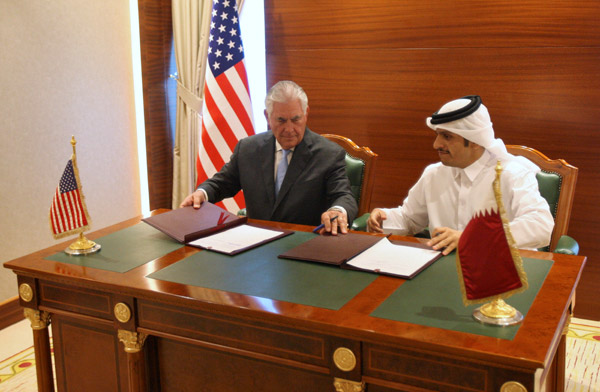JEDDAH, Saudi Arabia — US Secretary of State Rex Tillerson ended talks with ministers from Saudi Arabia and three Arab allies on Wednesday over how to end a month-long rift with Qatar but there was no immediate word of a breakthrough.
Tillerson, en route to mediating country Kuwait, had inked a US-Qatari accord on terrorism financing on Wednesday that Qatar's opponents said fell short of allaying their concerns.
Any resolution of the impasse must address all the key issues for Saudi Arabia, the United Arab Emirates, Bahrain and Egypt, including Doha's undermining of regional stability, a senior UAE official said ahead of the talks in Saudi Arabia.
The four countries slapped sanctions on Qatar on June 5, accusing it of financing extremist groups and allying with the Gulf Arab states' archfoe Iran. Doha denies those accusations. The four states and Qatar are all US allies.
Tillerson met the foreign ministers in Saudi Arabia’s Red Sea city of Jeddah in pursuit of an end to the worst dispute in decades among the US-allied Gulf Arab states.
Tillerson also met separately with Saudi King Salman and Crown Prince Mohammed Bin Salman to discuss cooperation in combating terrorism and its financing.
“We’re happy to see this continuous cooperation between us and [to] even strengthen it and increase it further without limits...,” Mohammed Bin Salman said in welcoming Tillerson.
In a joint statement issued after Tillerson and his Qatari counterpart signed their counter-terrorism pact, the four states called the accord inadequate.
They also reinstated 13 wide-ranging demands they had earlier submitted to Qatar, the world’s biggest producer of liquefied natural gas, as a condition for removing sanctions but later said were void.
The demands include curbing Qatar’s relations with Iran, closing the Doha-based Al Jazeera TV channel, shutting a Turkish military base in Qatar and handing over all designated “terrorists” on its territory.
UAE Anwar Gargash, UAE minister of state for foreign affairs, sent a formal complaint to the UN High Commissioner for Human Rights on Wednesday alleging that Al Jazeera supported terrorism, sectarianism and anti-Semitism.
Al Jazeera, which has denied allegations of stoking violence and says it practices free speech, did not immediately respond to a request for a comment.
UAE Foreign Minister Sheikh Abdullah Bin Zayed Al Nahayan told reporters during a visit to Slovakia that Tillerson’s visit was unlikely to resolve the row.
“I think it will ease tensions but it’s just postponing the problem, which will grow in the future.”
Not just funding of terrorism
The crisis transcends the financing of terrorism, said Jean-Marc Rickli, a risk analyst at the Geneva Centre for Security Policy, pointing to Gulf fears about the role of Iran, internal instability and the regional influence of the Muslim Brotherhood as well as competition for regional leadership.
“Whatever the outcome is, one of the two sides will lose face and losing face in the Arab world is something important. The consequences for the future will be negative for at least one camp or the other,” Rickli said.
France said its foreign minister would visit the Gulf, including Qatar and Saudi Arabia, on July 15-16 as part of its own efforts to overcome the rift.
In their statement on Tuesday, the four boycotting states said they appreciated US efforts in fighting terrorism.
“... [But] such a step is not enough and they will closely monitor the seriousness of Qatar in combating all forms of funding, supporting and fostering of terrorism”, the statement said, according to the UAE state news agency WAM.
The United States worries the crisis could affect its military and counter-terrorism operations and increase the regional influence of Iran, which has been supporting Qatar by allowing it to use air and sea links through its territory.
Qatar hosts Udeid Airbase, the largest US military facility in the Middle East, from which US-led coalition aircraft stage sorties against Daesh in Syria and Iraq.
